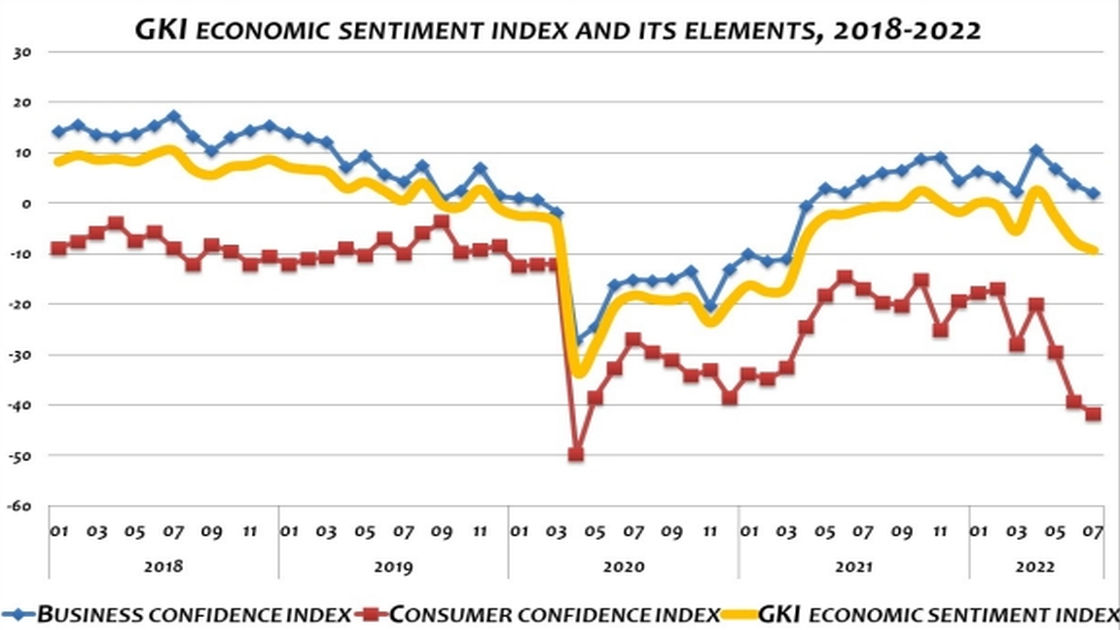GKI’s economic sentiment index fell in July to its more than one-year low, the lowest since March last year. According to the empirical survey conducted by GKI Economics Research Co. with the support of the EU, business expectations fell by around eight points since April this year, while consumer expectations dropped by more than 20 points, and pessimism among companies and households increased by a similar amount in July. (The household survey was carried out before the announcement of the ‘overhead increase’.) Overall, companies’ efforts to raise prices remained unchanged, while the assessment of the Hungarian economy continued to deteriorate.
The decline in the business confidence index in July was solely due to a marked deterioration in industrial expectations. Expectations in other sectors improved compared to June, although none of them reached their May levels. The industrial confidence index fell in July to its level recorded in April last year. The assessment of the production of the preceding and next periods, the stock of orders (including exports) and inventories deteriorated as well. After two months of deterioration, sentiment among construction companies corrected positively in July. Although the outlook for structural engineering continued to deteriorate, that for civil engineering improved noticeably.
However, this sub-sector remained the most pessimistic. Although satisfaction with the order book improved markedly, satisfaction with the previous three months’ production increased only less. Although the trade confidence index increased slightly compared to June, it is still not much higher than during the Covid pandemic. Commercial companies considered their order stocks to
be more favourable than in June, and they also saw their sales positions as better, while their inventories were slightly less favourable. The assessment of the state of business and the sales outlook among services improved, but that of the turnover of the previous quarter deteriorated.
In July, the slight deterioration of the business sector’s propensity to employ since April stopped, and except for construction, there were more companies planning to expand their workforce than to reduce it. Labour shortages remain the main obstacle to the expansion of companies’ activities. At the same time, the fear of unemployment of households has increased since April, albeit to a lesser extent. Companies’ efforts to raise prices remained unchanged in July, with most of them preparing to increase prices, except for services.
Price increases were mainly planned by commercial and construction companies, with the latter’s efforts intensifying in July. Inflationary expectations of households weakened slightly after several months of strengthening. Since the outbreak of the RussianUkrainian war, both companies and households saw the future state of the Hungarian economy as increasingly dramatic month by month. Deteriorating financial indicators and the government’s efforts to improve the balance may have contributed to this.


Leave a Reply Cancel reply
Top 5 Articles
 MVM Buys Huge Solar Power Plant in Tázlár December 20, 2023
MVM Buys Huge Solar Power Plant in Tázlár December 20, 2023  Tensions Escalate Between U.S. and Hungary after… March 15, 2024
Tensions Escalate Between U.S. and Hungary after… March 15, 2024  Hungarian Central Bank Head Warns of Autonomy Under Threat March 1, 2024
Hungarian Central Bank Head Warns of Autonomy Under Threat March 1, 2024  Alpine Comfort at a Mountain Lake December 19, 2023
Alpine Comfort at a Mountain Lake December 19, 2023  Hungary Faces Economic Headwinds as Recovery Falters February 16, 2024
Hungary Faces Economic Headwinds as Recovery Falters February 16, 2024








No comment yet. Be the first!